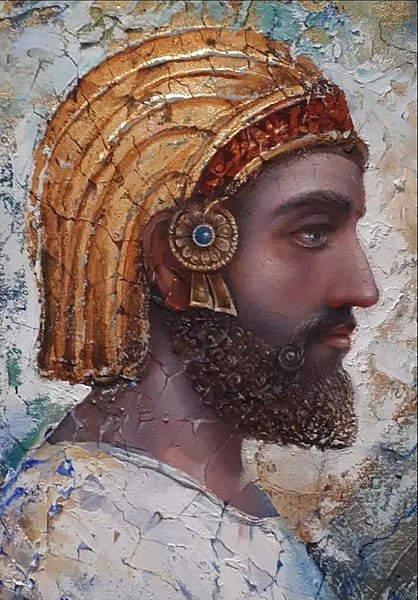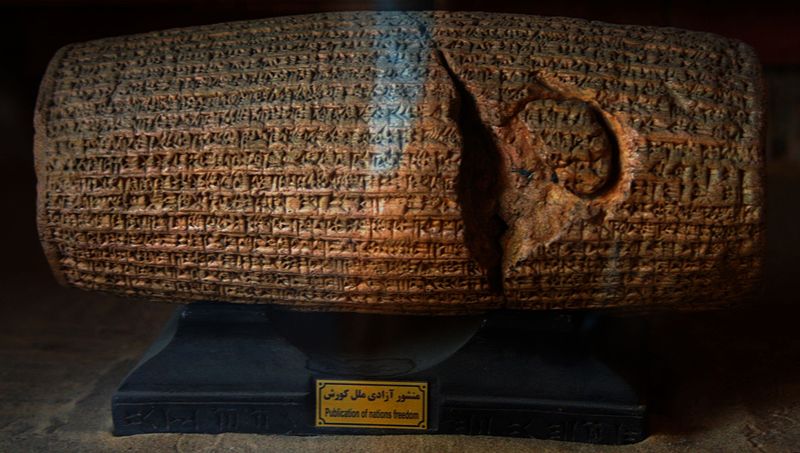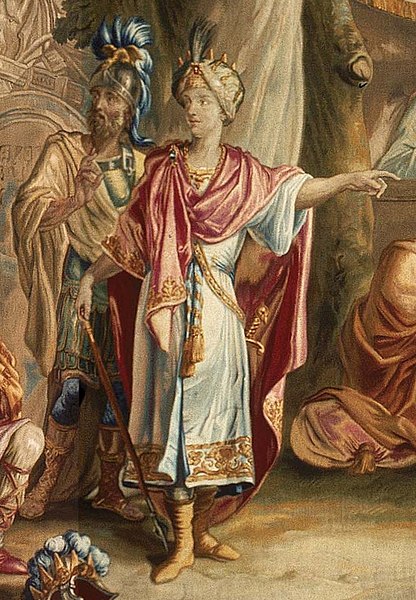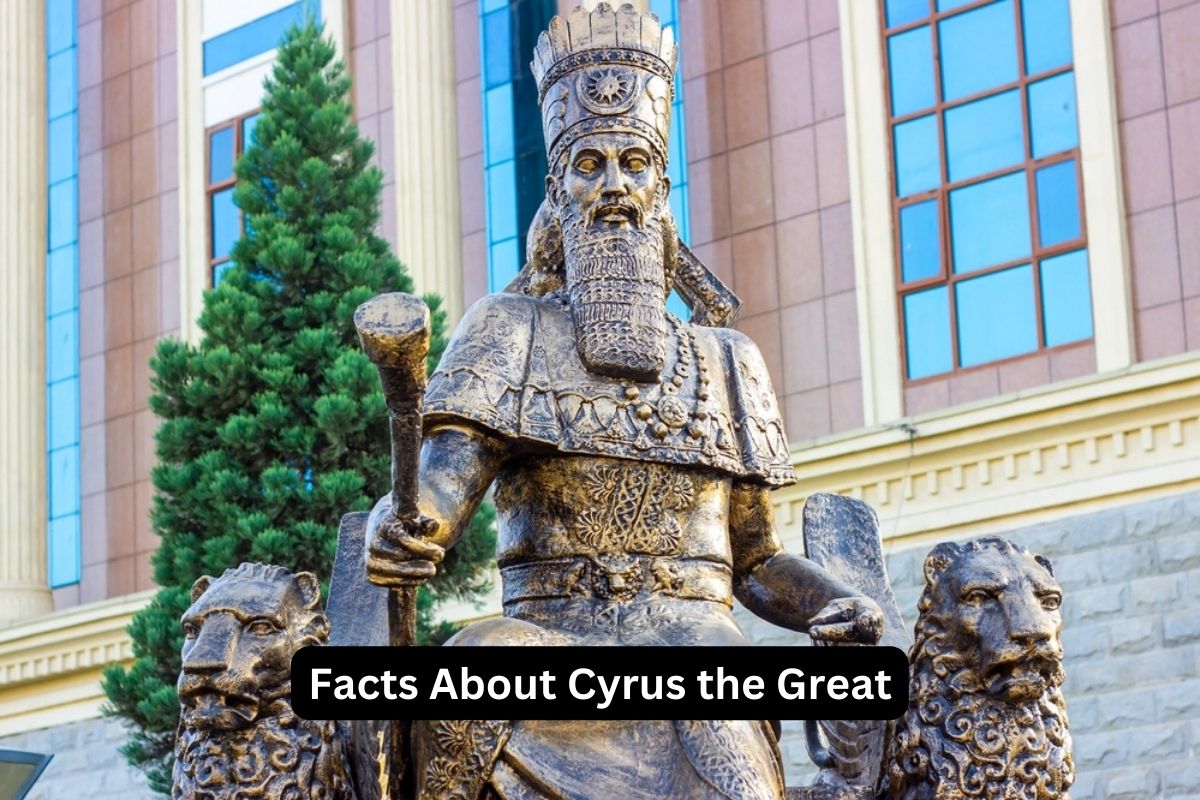Cyrus the Great, born around 600-576 BCE in Anshan, Persia, was the founder of the Achaemenid Empire, also known as the First Persian Empire. He is renowned for his military conquests, including the defeat of the Median, Lydian, and Neo-Babylonian Empires.
Cyrus’s rule is characterized by his policy of religious tolerance and respect for diverse cultures, as exemplified by the Cyrus Cylinder, often considered an early declaration of human rights. He died around 530 BCE, and his son Cambyses II succeeded him.
Cyrus’s legacy includes being a model of enlightened governance and leadership, influencing future leaders like Alexander the Great, and being documented in historical accounts by Greek, Babylonian, and Persian historians.
Cyrus the Great Facts
1. Born around 600-576 BCE in Anshan, Persia
Cyrus was born in the region of Anshan, which is now part of modern-day Iran. He was born into the royal family of Persia, which was part of the larger Achaemenid dynasty. His exact birth date is not known, but it is estimated to be around 600 to 576 BCE.

2. Founder of the Achaemenid Empire
Cyrus is best known for his role in founding the Achaemenid Empire, which is often referred to as the First Persian Empire. He achieved this through a series of military campaigns and conquests.
Also Read: Cyrus the Great Accomplishments
One of his most significant achievements was the defeat of the Median Empire in 550 BCE. This victory marked the beginning of his imperial expansion.
3. Conquered the Median, Lydian, and Neo-Babylonian Empires
Cyrus’s military campaigns extended beyond the Median Empire. After defeating the Medes, he went on to conquer the Lydian Empire, located in what is now western Turkey, in 546 BCE.
His conquest of the Lydian Empire brought him into conflict with its ruler, King Croesus. The famous tale of Croesus’s encounter with the oracle at Delphi, which predicted his defeat by a great power, is associated with this campaign.
Also Read: Timeline of Cyrus the Great
Perhaps Cyrus’s most famous conquest was that of the Neo-Babylonian Empire in 539 BCE. Under the rule of King Nabonidus, Babylon had become a powerful and influential city-state.
However, Cyrus’s forces captured the city of Babylon, marking the end of the Neo-Babylonian Empire and the incorporation of its territories into the expanding Achaemenid Empire.
This conquest is described in the famous Cyrus Cylinder, which highlights his policy of allowing conquered peoples to return to their homelands and practice their own religions.
4. The Cyrus Cylinder is a famous artifact associated with him
The Cyrus Cylinder is one of the most famous artifacts associated with Cyrus the Great. It is a clay cylinder inscribed with cuneiform script and is often considered one of the earliest declarations of human rights in history.

The cylinder commemorates Cyrus’s conquest of Babylon in 539 BCE and his policy of allowing conquered peoples to return to their homelands and practice their own religions.
This policy of religious and cultural tolerance is a hallmark of his reign and is celebrated as an early example of human rights in governance.
5. Known for religious tolerance and human rights
Cyrus the Great is renowned for his policy of religious tolerance. Unlike many conquerors of his time, he allowed the peoples he conquered to practice their own religions and worship their own gods.
He even facilitated the rebuilding of temples and the return of sacred artifacts to their original locations. This approach not only promoted social harmony but also contributed to the stability of his empire by gaining the loyalty of diverse subject populations.
6. Exact cause of his death is debated
The exact circumstances of Cyrus the Great’s death remain a subject of historical debate. Several accounts exist, and they vary in their details. One account suggests that he died in battle while campaigning against the Massagetae, a nomadic warrior people located to the east of his empire.
According to this account, he was killed in a battle with their queen, Tomyris. Another account suggests that he was assassinated or died as a result of a conspiracy within his court.
Regardless of the exact circumstances, Cyrus’s death marked the end of an era. He passed away around 530 BCE, leaving behind a legacy of conquests and a model of enlightened governance that would influence future leaders and shape the history of the Achaemenid Empire for generations to come.

7. Succeeded by his son Cambyses II
After the death of Cyrus the Great, he was succeeded by his son Cambyses II. Cambyses continued his father’s expansionist policies by conquering Egypt in 525 BCE, further expanding the Achaemenid Empire’s territory.
However, Cambyses’s rule was marked by some controversy and unrest, and his reign did not match the enduring legacy of his father.
8. Left a lasting legacy on governance and leadership
Cyrus the Great left behind a remarkable legacy in the history of governance and leadership. His reign is often remembered for its benevolence, religious tolerance, and respect for local customs and traditions.
Cyrus’s policies of decentralization of power, allowing conquered peoples to maintain their cultural practices, and his role in creating the Cyrus Cylinder set a standard for just and humane rule.
His legacy became a model for subsequent Persian rulers and even influenced leaders beyond Persia, such as Alexander the Great.
9. Influenced future leaders like Alexander the Great
The principles and leadership style of Cyrus the Great continued to influence many leaders throughout history. For example, Alexander the Great, who conquered the Achaemenid Empire, admired Cyrus and even visited his tomb in Pasargadae as a sign of respect.
Alexander reportedly said that he wanted to follow in Cyrus’s footsteps in terms of governance and leadership.
10. Historical accounts come from Greek and Persian sources
Much of what we know about Cyrus the Great comes from various historical accounts, including those by Greek historians like Herodotus and Xenophon, as well as Babylonian and Persian inscriptions.
These historical records provide valuable insights into Cyrus’s life, achievements, and the impact of his rule on the ancient world. Herodotus, in particular, wrote extensively about Cyrus’s conquests and the customs of the Persians.
